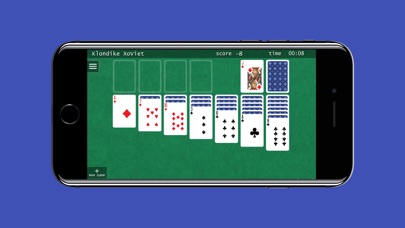
Klondike: Solitaire Classic
Klondike is a patience game (solitaire cards game). Klondike is known as solitaire, being one of the better of the family of patience games. The game rose to fame in the late 19th century, being named "Klondike" after the Canadian region where a gold rush happened. It is rumored that the game was either created or popularized by the prospectors in Klondike. Klondike is the most commonly played Solitaire variation.
**Features**
- Play Solitaire for free with beautiful graphics.
- Play Solitaire offline without the Internet Connection.
- Change the difficulty: drawing one and draw three cards.
- Feel free to customize the theme with two sets of cards.
Download "The Klondike Solitaire" now and start climbing the Global High-Score! Get it now, its FREE!!
*The pack & object of the game:
The standard 52-card pack is used. The goal is to get the four suits built onto the foundations from aces up through kings.
*The deal:
Deal out 28 cards in seven piles as follows: The first pile is one card; the second pile has two cards, and so on up to seven in the last pile. The top card of each pile is face up; all others are face down.
*Gameplay:
The four aces from the foundations. As it becomes available, each ace must be played in a row above the piles. Cards in the appropriate suit are then played on the aces in sequence the two, then the three, and so on as they become available.
Any movable card may be placed on a card next-higher in rank if it is of opposite color. Example: A black five may be played on a red six. If more than one card is face up on a tableau pile, all such cards must be moved as a unit. When there is no face-up card left on a pile, the top face-down card is turned up and becomes available.
Only a king may fill an open space in the layout. The player turns up cards from the top of the stock in groups of three, and the top card of the three may be used for building on the piles, if possible, played on a foundation. If a card is used in this manner, the card below it becomes available for play. If the up-card cannot be used, the one, two, or three cards of the group are placed face up on the waste pile, and the next group of three cards is turned up.

